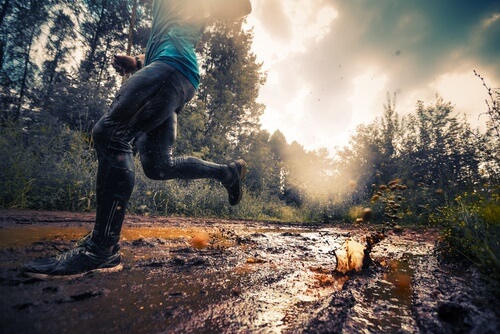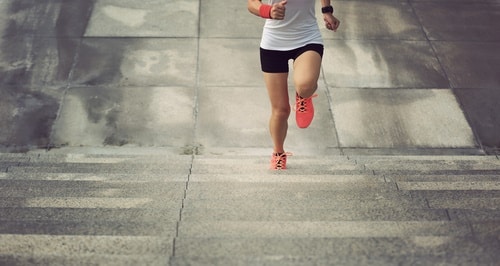Best Running Shoes for Achilles Tendonitis
This page contains affiliate links. As an Amazon Associate I earn from qualifying purchases.
Achilles tendonitis can be said to be an injury caused by the excess use of the Achilles tendon that consequently results in deterioration, pain or swelling.
This tendon is a group of tissue that connects calf muscles (gastrocnemius and soleus) to your heel bone. So it is the Achilles tendon that causes extension of the foot, whenever the muscles contract.
Runners, who make sudden decisions to increase their training duration or intensity are even more prone to this condition.
Finally, if this tendon is not well protected with the right shoes and other preventive measures until full recovery, the tendon may even rupture.
Quick Navigation
At a Glance: Our Top Picks for Best Running Shoes for Achilles Tendonitis
IMAGE
PRODUCT
DETAILS
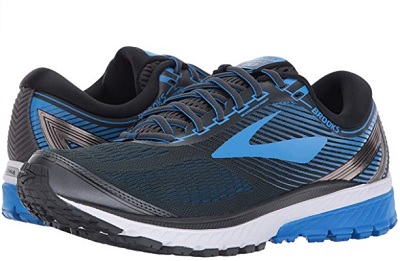
View on Amazon → 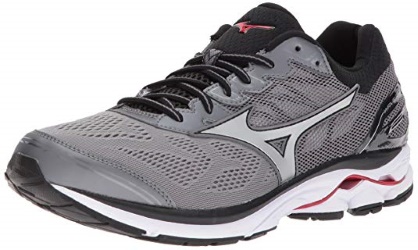
View on Amazon → 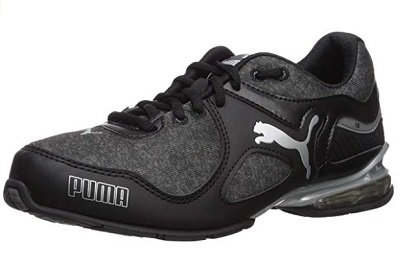
View on Amazon → 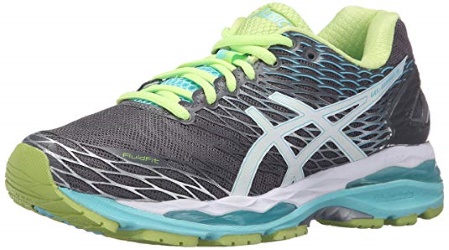
View on Amazon → 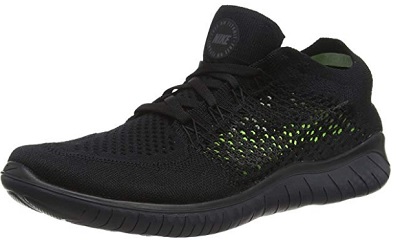
View on Amazon →
Best Rated Running Shoes for Achilles Tendonitis Reviewed
The pain that the Achilles tendonitis condition causes can be quite unbearable and certainly gets worse if neglected.
To start with, having the best running shoes for this condition is one of the best ways to gradually heal the inflamed tendon, while also doing something that you simply love – running.

- Offers great ankle stability from the heel collar
- Cushion adapts to each stride
- Proper height
- Has large pores for proper ventilation
- Lace holes are not wide enough
- Limited colors to choose from
- Offers great ankle stability from the heel collar
- Cushion adapts to each stride
- Proper height
- Has large pores for proper ventilation
- Lace holes are not wide enough
- Limited colors to choose from

- Great quality and sturdy
- Has a well-ventilated and seamless engineered mesh
- Comfortable height and great support
- Poor cushioning
- Does not have a good grip on wet surfaces
- Great quality and sturdy
- Has a well-ventilated and seamless engineered mesh
- Comfortable height and great support
- Poor cushioning
- Does not have a good grip on wet surfaces

- Great arch support
- Comfortable cushioning
- Fits snugly
- Protects foot from injury
- Not suitable for running long distances
- The heel fabric wears out fast
- Great arch support
- Comfortable cushioning
- Fits snugly
- Protects foot from injury
- Not suitable for running long distances
- The heel fabric wears out fast

- Energizing cushioning
- Great shock absorbance
- Convergence gel cushioning
- High traction
- Heavier than other shoes
- Quite expensive
- Energizing cushioning
- Great shock absorbance
- Convergence gel cushioning
- High traction
- Heavier than other shoes
- Quite expensive

- Affordable
- Offers great arch support
- Good lacing system that offers comfort
- The upper part of the shoe wears out quite easily
- Does not offer good traction
- Affordable
- Offers great arch support
- Good lacing system that offers comfort
- The upper part of the shoe wears out quite easily
- Does not offer good traction
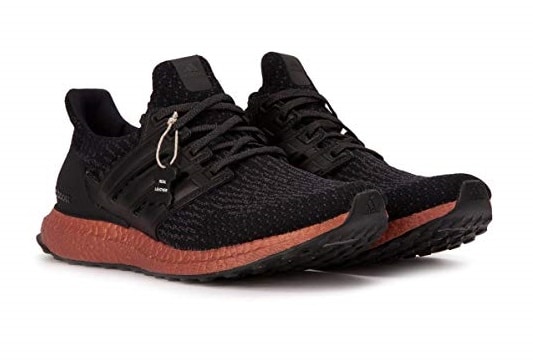
- Provides maximum comfort
- Superior midsole for excellent cushioning
- Very good energy-return boost technology
- Protects from falling
- Quite pricey
- Narrow fit
- The nubs under the shoes are not durable
- Provides maximum comfort
- Superior midsole for excellent cushioning
- Very good energy-return boost technology
- Protects from falling
- Quite pricey
- Narrow fit
- The nubs under the shoes are not durable

- Sturdy and well built
- It helps prevent fraying
- Provides support and breathability
- Has lightweight cushioning
- Heavy
- Pricey
- Quite narrow for people with wide feet
- Sturdy and well built
- It helps prevent fraying
- Provides support and breathability
- Has lightweight cushioning
- Heavy
- Pricey
- Quite narrow for people with wide feet

- Well ventilated mesh
- Snug and comfortable
- Great shock and impact absorber
- Usually small-sized
- Not durable
- Well ventilated mesh
- Snug and comfortable
- Great shock and impact absorber
- Usually small-sized
- Not durable

- Has removable and replaceable sock liner
- Midsole is well cushioned
- Has a lace-up closure
- Great shock and pressure absorber
- Toe box is too wide
- Has removable and replaceable sock liner
- Midsole is well cushioned
- Has a lace-up closure
- Great shock and pressure absorber
- Toe box is too wide
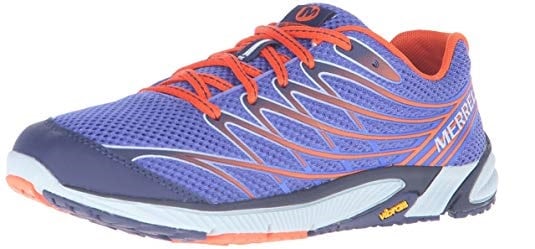
- Machine-washable
- Has antimicrobial agents to deal with odors
- Great breathability
- Very good traction
- Good bounce
- Ideal for long distance
- Arch is quite high
- Quite narrow
- Not quite durable
- Machine-washable
- Has antimicrobial agents to deal with odors
- Great breathability
- Very good traction
- Good bounce
- Ideal for long distance
- Arch is quite high
- Quite narrow
- Not quite durable
Causes of Achilles Tendonitis
There are plenty of reasons why a runner or someone who is active may experience Achilles tendonitis. The following are some of the most common causes.
- Excess use of the tendon muscles – First of all, running long distances with the wrong shoes is the worst thing to do. As this will eventually cause a lot of strain on your tendon muscles and cause it to react unfavorably. Click here for info on the best running shoes for long distance
- Improper use of the tendon muscles – Some runners use their tendon muscles improperly, especially during workouts. As a result, this causes discomfort, so, the feet should not be stuck in tight places nor be forced to bend beyond its normal limits. Click here to read more about the Best Running Shoes for Peroneal Tendonitis
- Extreme pronation of the foot during movement – Although pronation during movement is normal, but when done excessively, it strains your muscles and consequently results in Achilles tendonitis. Read more about the Best Running Shoes for Overpronation here
Signs and Symptoms of Achilles Tendinitis
It is important to take note of the following signs or symptoms to see whether or not you are suffering from Achilles Tendonitis.
- Continuous or intermittent pain on the heel bone
- Soreness on the affected tendon
- Swelling
- Difficulty in mobility and flexibility of the ankle joint
Preventive Measures
While experiencing Achilles Tendonitis, you can do some of the following to make sure that you prevent this from happening:
- Wear the right shoes for sufficient cushioning and to ease the discomfort
- Engage in exercises that will strengthen the tendon muscles
- Stretch the tendon muscles before embarking on any physical activity involving the legs (like taking long walks, jogging or running)
Treatment of Achilles Tendonitis
There are several ways to recover from Achilles tendonitis, it however requires a lot of patience and consistency before complete recovery can be achieved.
- Rest
- Exercises
- Application of ice to the affected tendon
- Use of non-steroidal anti-inflammatory agents
- Physical therapy
- Orthotics
- Use of night splints
- Use of proper shoes or boots that prevent stretching of the heel bone while walking
Qualities to Look for Running Shoes for Achilles Tendonitis
First of all, you need to know the qualities of the best running shoes for Achilles tendonitis because there are many products in the market that claim to ease the pain.
However, such products making tall claims may not necessarily ease the pain inflicted upon your heels by this awful condition.
It seems like the only way out is to get the right shoes for this condition, to ease your discomfort during recuperation, speed-up recovery and also to put a stop to its recurrence.
On the other hand, getting the wrong shoes will invariably make this condition worse.
- The heel should be well cushioned – The best running shoes for Achilles tendonitis would be one that’s rightly cushioned to offer comfort. That’s because cushioning that’s too soft or too hard could worsen your condition and make it altogether very hard to run.
- The ball of the foot should provide adequate bending – The best running shoes for Achilles tendonitis should be firm enough. Also, it should only bend precisely underneath the ball of the foot so as to give you the proper foot movement. This must, in fact, be a priority for the reason that anything else will either cause Achilles tendonitis or worsen that condition.
- The heel height should be appropriate – The best running shoes for Achilles tendonitis offers enough room for your tendon to stretch while walking or running. That’s essential for the reason that inadequate elevation could either put too much pressure on your inflamed tendon or complicate the problem.
- The arch support should be satisfactory – The best running shoes for Achilles tendonitis give the foot adequate arch support. So as to prevent further injury to your tendon and to speed up the healing process.
- The ankle collar should be appropriate – The shoes must have a very good ankle collar, for the reason that it enables mobility of the foot. Also, it is said to prevent fractures caused by shocking steps and wrong movements.
- The shoe should be flexible – First of all, the best running shoes for Achilles tendonitis should offer flexibility and stability in the right place. Above all, your tendon needs space to stretch properly for the reason that it is your shoe size that determines whether the tendon has enough room to do that. That little extra room certainly reduces the pressure on your injured tendon and speeds up the recovery process. So, you need to get the best shoes for your condition.
- The insoles should offer heel and arch support – The best running shoes for Achilles tendonitis should give the runner’s feet two basic things – cushioning and elevation for the reason that these two features give the runner the right heel and height support to run long distances without causing discomfort to the tendons.
- The shoe should fit perfectly – The best running shoes for Achilles tendonitis should fit you comfortably. That’s because, when worn for hours, tight shoes hurt and cause general discomfort. So, while loose shoes would be difficult to move around in, the tight ones also won’t serve the purpose. Therefore, your foot should be well measured, and the shoe must be tested before you purchase it, just to make sure that it fits perfectly.
Final Thoughts
First of all, to figure out the best running shoes to soothe your Achilles tendonitis condition, you have to look for the type and model that will make you feel better and heal your achilles tendon faster.
That’s because straining your tendons is likely to worsen your condition and keep you off the track for some time.
Finally, the best shoe for achilles tendon would be one that offers maximum comfort, relieves pain and gives you an overall great running experience.

